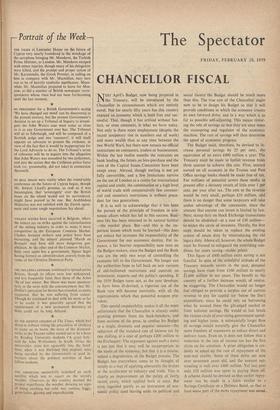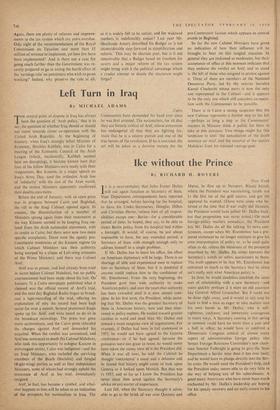CHANCELLOR FISCAL
NEXT April's Budget, now being prepared in the Treasury, will be introduced by the Chancellor in circumstances which are entirely novel. Not for nearly fifty years has this country enjoyed an .economy which is both free and sue- cessful. That, though it has arrived without fan- fare, or even comment, is what we have today. Not only is there more employment (despite the recent temporary rise in numbers out of work) and more wealth than at any time between the two World Wars, but there now remain no official restrictions on consumers, traders or businessmen. Within the last twelve months the restraints on bank lending, the fetters on hire-purchase and the veto of the Capital Issues Committee have been swept away. Abroad, though sterling is not yet fully convertible, and a few limitations survive on the use of London as a centre for international capital and credit, the combination of a high level of world trade with comparatively few commer- cial and monetary restrictions is without prece- dent for two generations.
It is as well to acknowledge that it has been the pursuit of the principle of freedom in eco- nomic affairs which has led to this success. Busi- ness life has been returned to its natural' habitat —the market place. But—and this is the im- portant lesson which must be learned—this does not reduce but increases the responsibility of the Government for our economic destiny. For in- stance, a far heavier responsibility now rests on the Budget-makers, since the Budget and the Bank rate are the only two ways of controlling the economy left to the Government. No longer can the authorities hope to fall back on new variants of old-fashioned restrictions and controls on investment, imports and the public's spending. If the 1959 Budget turns out, as the year develops, to have been ill-devised, a vigorous use of the Bank rate will become inevitable, with all the repercussions which that powerful weapon pro- vokes.
This special responsibility makes it all the more unfortunate that the Chancellor is already under growing pressure from his back-benchers, and from sections of the press, to confine his Budget to a single, dramatic and popular measure—the reduction of the standard rate of income tax by one shilling, at a cost of 'perhaps £200 million to the Exchequer. The argument against such a move is not just that it may well be inappropriate to the heeds of the economy, but that it is a misuse, indeed a ,degradation, of the Budget process. The Budget has everywhere come to be thought of simply as a way of applying alternately the brakes or the accelerator to industry and trade. This is clearly an improvement on the policy of fairly recent years, which applied both at once. But even regarded purely as an instrument of eco- nomic policy (and leaving aside its political and social facets) the Budget should be much more than this. The true aim of the Chancellor ought now to be to design his Budget so that it will provide conditions in which the economy creates its own forward drive, and in a way which is as far as possible self-adjusting. This means restor- ing the role of savings so that they are once more the mainspring and regulator of the economic machine. The rate of savings will then determine the speed of economic progress.
The Budget must, therefore, be devised to in- crease personal savings by 25 per cent., the equivalent of an extra £400 million a year. The Treasury must be made to forfeit• revenue from three sources to achieve this aim. First, interest earned on all accounts in the Trustee and Post Office savings banks should be made free of tax. For millions of potential savers these media at present offer a derisory return of little over 1 per cent. per year after tax. The cost to the revenue would be very small, perhaps £10 million, and there is no danger that some taxpayers will take undue advantage of the concession, since the amount that anyone can invest is limited by law. Next, stamp duty on Stock Exchange transactions should be abolished—at a cost of £30 million— to widen the circle of investors. Thirdly, the first steps should be taken to replace the existing system of estate duty by reintroducing the old legacy duty. Above all, however, the whole Budget must be framed to safeguard the overriding con- dition for more saving—stable prices.
This figure of £400 million extra saving is not fanciful. In spite of the unhelpful attitude of the Treasury towards savers in the past, personal savings have risen from £160 million to nearly 11,600 million in ten years. The benefit to the country of a further increase would, of course, be staggering. The Chancellor would no longer feel obliged to provide a surplus out of current revenue to pay for capital (or 'below the line') expenditure, since he could rely on borrowing what he wanted from the gilt-edged market or from national savings. He would at last break the vicious circle of ever-rising government spend- ing and higher. taxes. A substantially larger flow of savings would naturally give the Chancellor more freedom of manoeuvre to reduce direct and indirect taxes. Even so, it does not follow that a reduction in the rate of income tax has the first claim on his attention. A prior obligation is cer- tainly to speed up the rate of repayment of the post-war credits. Some of these debts are now over seventeen years old, and the amount out- standing is well over £400 million. Yet last year only £18 million was spent in paying them off. A scheme should be devised so that earlier repay- ment can be made in a form similar to a Savings Certificate or a Defence Bond, so that at least some part of the extra repayment was saved. Again, there are plenty of reforms and improve- ments to the tax system which are years overdue. Only eight of the recommendations of the Royal Commission on Taxation cost more than £5 million of revenue to implement, yet how few have been implemented! And is there not a case for going much farther than the Government was re- cently prepared to go in easing the harsh effect of the 'earnings rule' on pensioners who wish to go on working? Indeed, why preserve the rule at all, as it is widely felt to be unfair, and for widowed mothers is indefensibly unjust? Last year Mr. Heathcoat Amory described his Budget as 'a not inconsiderable step forward in simplification and reform.' This may be election year, but is it not conceivable that a Budget based on freedom for savers and a major reform of the tax system might bring with it the political advantage which a cruder attempt to dazzle the electorate might forgo?



































 Previous page
Previous page